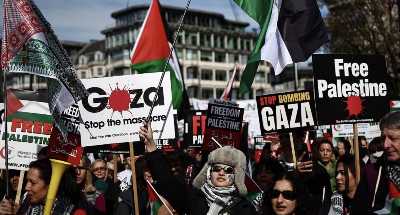anon_vatw said in #4667 3mo ago:

>"Secure the borders and ignore" is not a realistic option. The Gaza war has killed 50k people so far; ask yourself honestly if the world would watch the daily tiktok livestreams emanating from a 10-million-death famine without taking action.
On the implicit theory here, widespread attention to atrocities is natural. Whether because of humanitarian concern or salacious "if it bleeds it leads" clickbaiting or whatever mechanism, mass deaths will organically become widely known. If something *this* deadly gets *this* much attention, then it stands to reason that a disaster 200 times deadlier would get proportionately more attention.
Others point out it doesn't work this way. An anon responds:
>The attention Gaza gets is somewhat exceptional. That may be due to the fact that Palestine is a very long-running issue, so has accumulated interest over time. The area is of religious significance as well, meaning everyone knows about it.
Anon is correct, the Gaza case is exceptional. Why? There are plenty of conflicts far deadlier and far more brutal which get much much less attention in the West. You can name as many examples as you like. For now I'll just mention the ongoing Yemeni civil war, which is several times deadlier than the Gaza war yet mostly gets attention in the West when one of the participants launches a symbolic attack at Israel.
A different anon:
>I’m guessing if you looked, you could find all kinds of footage of warlords butchering people on DRC or the CAR (admittedly I haven’t tried).
Of course basically nobody goes looking for footage of atrocities. You'd have to be sick in the head. You see coverage of atrocities when it's shoved in front of you. But of course that's far too passive voice and hiding the ball. Someone has to do the shoving.
For every atrocity you see covered in the media, specific people and organizations are responsible for publicizing it. This is difficult work. It requires skill, diligence, and scale. All of those things cost money. They have to document (and/or fabricate) the facts on the ground with the shocking stories and the horrible pictures and the collated statistics. They have to package that into a well-designed narrative which other groups will find compelling and appealing, so that it'll get picked up and turn from a mere PR campaign into a self-propelling Discourse object.
This can be incredibly powerful when done well. If you pay attention to the numbers in your high school history textbook you'll notice the Nazis killed more Slavs than they killed Jews, for explicitly genocidal reasons ("untermenschen") even more central to their ideology than exterminating Jews. But Israel had Yad Vashem and the whole apparatus around that, while the Slavs had nothing anywhere near that level, so today one of those gets a lot more attention than the other.
Why is the case of Gaza exceptional? It's not because it's in the Holy Land, it's not because the conflict has been going on for eighty years, and it's not because of antisemitism. It's because someone put in the work to make it an exception. In this case most of the money behind the operation is Qatari. They crafted a narrative that appeals to gay race communists in the West, they employed a bunch of people to produce a constant drumbeat of real and fake atrocity stories, and they clearly did a very good job. It's the same basic principles as https://paulgraham.com/submarine.html applied to different subject matter.
For any atrocity that becomes widely known, you can dig and find the specific group who did the work to promote it. Sometimes they try to downplay their role but sometimes they're very public and proud of their work. If this doesn't sound obvious then I encourage you to pick an example I didn't mention in this post and try it yourself.
referenced by: >>4668
There's a point in >